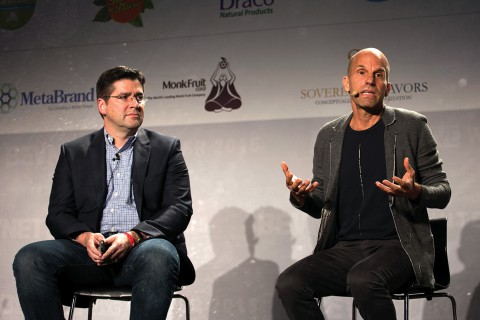BevNET Live Winter Roundup

As much as the spirit of BevNET Live is one rooted in education, collaboration and mobilization, the bi-annual conference for beverage entrepreneurs, suppliers, distributors, retailers and investors has always embraced the fiercely competitive nature of the industry.
So as day one of the event’s 2015 winter session began, 15 upstarts started cranking up their pitches in pursuit of victory in the New Beverage Showdown. The contestants, whose startup products varied from those challenging the status quo of existing beverage categories (sports drinks, coconut water, matcha, plant-based milk alternatives) to those looking to establish themselves as pioneers in entirely new ones (sun protective drinks, bottled bone broth) pitched their products to a five-headed panel of expert judges, who evaluated the brands based on their concept, taste, packaging design, function and overall likelihood to succeed in today’s ever-evolving beverage landscape.
The whittled-down roster of finalists would reflect important trends emerging in the food and beverage world: Bru Broth (a bone broth company), MALK (a nut milk maker), Tea Riot (a functional tea brand), 1821 Bitters (cocktail mixers), Three Trees (almond milk) and Chuga Chaga (adaptogenics) advancing to the final round of six.
As competition cooled, the event moved toward strategy and case studies: BevNET Editor-in-Chief Jeff Klineman took to the stage to recap the trends that had affected the beverage industry in 2015. Given the monumental growth of RTD cold brew coffee, the year in review would also serve as a fitting introduction for the morning’s first featured speaker, Stumptown Coffee Roasters president Joth Ricci. His presentation, “Keeping the Soul of the Premium Brand,” arrived on the heels of Stumptown’s acquisition by Peet’s Coffee in October, arguably the most high profile validation of the “third wave coffee” category to date.
Ricci would also use his stage time as a platform to announce an upcoming product launch for Stumptown: a dairy-free, coconut milk-based cold brew coffee, which he said came in response to consumer demand for a dairy-free cold brew coffee offering. Made without carrageenan or stabilizers, the new product is set to launch at the top of 2016.
Self-identifying “biohacker” Dave Asprey next shared his journey from Silicon Valley tech entrepreneur to the man behind the Bulletproof Coffee craze to his most recent venture with FATwater. In doing so, Asprey offered the audience a look into how he’s been able to build a cult-like following for products that boldly defy conventional notions of what’s considered a good-for-you beverage.
“The brand that you’re building is in partnership with the community that you’re serving,” Asprey stated. “So if you’re building a brand, you figure out who your target market is and you spend as much time with them as you possibly can. You understand them psychologically. Ideally you are one of them, and you show them that you’re one of them.”
Kevin Klock, CEO of Sparkling Ice’s parent company Talking Rain, would follow Asprey, exploring the “More Money, More Problems” growing pains that can arise after a company experiences the level of success that Sparkling Ice has. In doing so Klock pointed to building a brand that can appeal across wide demographic groups, meeting adjusted retailer expectations and new performance standards for innovation and personnel as examples.
“For us, I think the biggest challenge has been being able to step back and rather than just focus on growth to focus on steady, smart growth,” Klock revealed. “To take the right steps to settle in and get this whole new system working.”
7-Eleven’s executive vice president and chief merchandising officer, Jesus Delgado-Jenkins, would sit down with BevNET’s Klineman next, giving some insight into how the convenience store giant has recently begun opening its doors to support smaller, innovative entrepreneurial brands, and assisting them in catching on in the retailer.
“In the last 24 months I’d say we’ve become very open to doing regional and local products,” Delgado-Jenkins stated. “You don’t have to be in every single store. You don’t even have to be in every single store within a region. If we’ve got 900 stores in Los Angeles but your product only makes sense in 400 of those stores, we’re very open to driving that type of presence.”
Before announcing the New Beverage Showdown’s finalists, BevNET Managing Editor Ray Latif sat down with three recent winners of the competition to discuss how each has fared since. Daina Trout, the CEO and co-founder of Health-Ade, Daren Myers, the co-founder of Rau Chocolate, and Austin Allan, the founder of Tio Gazpacho, discussed the opportunities that their Showdown wins provided in terms of exposure, as well as their ongoing business strategies. The panel discussion also provided beverage entrepreneurs with a deep dive into the challenges faced by growing brands and how Health-Ade, Tio and Rau have approached them.
“You have to have a strong business plan,” said Allan. “I did not for a while and it wasn’t until I finalized a really strong business plan that people started to pay attention.
Day 2 of the conference began with a data focus, as the team of IRI’s Brian Reed and Kathryn Peters of SPINS, who explored trending beverage categories across different retail channels. The gist: what was once niche is now mainstream.
Reed reported volume growth of three percent for the total beverage refreshment category, with a steady decline in traditional types of beverages like carbonated soft drinks, refrigerated orange juices and shelf stable juices offset by 19 percent growth in natural beverages. Peters would attribute the findings to consumers’ increasing demand for variety and innovation, as well as those in attendance.
“It’s really those of you in this room that are driving a lot of the innovation and the new dollars that are coming into refreshment beverages,” she stated.

Peters would also note that despite the declines in traditional beverage categories like CSDs, companies have still been able to post dollar sales growth in spite of losses in volume by way of things like innovative packaging choices, pointing to the success of items like Coca-Cola’s 8 oz. mini cans as an example.
Suja Juice co-founder and CEO Jeff Church graced the stage next, pulling back the curtain on all that went into Suja’s massive year that culminated in the August announcement that the Coca-Cola Company had acquired a minority stake worth $90 million in the cold-pressed juice category frontrunner. Church also outlined what a Coke-backed Suja means for the brand as it heads into the new year with new muscle behind it.
“What I’ve loved about the relationship so far is that Coke recognizes that they do certain things really well as a big company, like distribution, like cost, but that there are certain things they don’t do as well, like innovate quickly or speed to market,” Church said. “So we’ve been able to get those advantages of a larger company like Coke while retaining the entrepreneurship of a smaller company.”

Church’s remarks were followed by the return of the New Beverage Showdown’s six finalists who extended their “elevator pitches” from Monday’s semi-final round to a proper five minute presentation. While most of the brands had passed the taste test by this point, judges still expressed a handful of concerns they had about the contestants pertaining to their packaging, brand identity, and their ability to compete with larger players in their respective categories.
In introducing Campbell Fresh, the new, store perimeter focused division in which his company now resides, Bolthouse Farms president and general manager Scott LaPorta declared that the company was looking to expand either by innovation or by acquisition — noting that C-Fresh, as it is called, wanted to go into 30 different categories from its current 10. Bolthouse’s 3-year foray into the convenience store channel had taught LaPorta that in-store promotion, sharp price points, and “providing an unduplicated choice” are keys to success in that channel.
Kent Pilakowski, president and founder of sales management and consulting firm IGNITE, then discussed “push points” in his presentation on growth strategy for evolving companies, explaining that scale comes through professionalizing at key moments and when CEOs determine their core abilities and fill out the rest through hiring or contracting.
Next to the stage, Evolution Fresh President Jeff Hansberry and founder Jimmy Rosenberg discussed the roles that each play in nurturing the vision that led to the brand’s acquisition by Starbucks in 2011. Hansberry and Rosenberg reflected on how the two companies first saw alignment in DNA and values and why a focus on quality first and foremost drives Evolution’s growth strategy amid a rapidly changing cold-pressed juice category.

Fashion industry executive turned juice bar entrepreneur Alex Matthews detailed the development of his company Juice Served Here, which has expanded from a single Los Angeles location to 12 locations as part of a “store per month” plan launched at the top of 2015. Matthews revealed he expects to continue opening Juice Served Here locations at the same rate heading into 2016, saying the climate of the city’s juicing culture warrants such accelerated expansion.
Following Blake Mitchell and Becky Nelson’s (of design and branding agencies Interact on Shelf and Bex Brands, respectively) look at packaging trends being seen across the industry, Campbell Soup Company’s vice president of beverages Kelli McCusker explored the process of reframing longtime legacy brands in order to adapt to an ever-evolving market. Since joining the company in 2014, McCusker’s been working towards doing just that with Campbell’s V8 brand, pushing product innovation and promotion to breathe new life into V8’s core offering: vegetables.
“Job number one is doing the right new things, but what’s more important is having the courage to step away from the old things that have worked in the past, because sometimes those old things might keep you steeped in the past instead of propelling you to where you need to go,” she said. “Forward.”
As the afternoon came to a close, competition ruled once again: the New Beverage Showdown’s judges returned to the stage one last time to announce a winner. While the audience vote belonged to Missy and Kristen Koefod of 18.21 Bitters, it was Houston-based nut milk brand MALK Organics that won over the judges, taking home the $5,000 cash prize.
Full of knowledge, full of competitive fire, the year-end break was over: it was time to start selling again.


Receive your free magazine!
Join thousands of other food and beverage professionals who utilize BevNET Magazine to stay up-to-date on current trends and news within the food and beverage world.
Receive your free copy of the magazine 6x per year in digital or print and utilize insights on consumer behavior, brand growth, category volume, and trend forecasting.
Subscribe